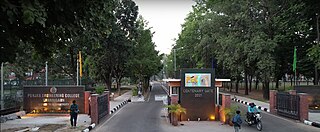
Civil engineering is a professional engineering discipline that deals with the design, construction, and maintenance of the physical and naturally built environment, including public works such as roads, bridges, canals, dams, airports, sewage systems, pipelines, structural components of buildings, and railways.

Engineering is the practice of using natural science, mathematics, and the engineering design process to solve problems, increase efficiency and productivity, and improve systems. Modern engineering comprises many subfields which include designing and creating infrastructure, machinery, vehicles, electronics, materials, and energy.

The University of the Philippines Diliman, also referred to as UP Diliman or simply University of the Philippines (UP), is a public, coeducational, research university located in Diliman, Quezon City, Philippines. It was established on February 12, 1949, as the flagship campus and seat of administration of the University of the Philippines System, the premier and national university of the Philippines.

Punjab Engineering College is a public research & technical institution in Chandigarh. It was founded in 1921 in Lahore, established in Chandigarh in 1953, and focuses on the field of applied sciences, particularly engineering and technology. It is known for its two-year and four-year programmes for which the entry is through the Joint Entrance Examination – Mains and Graduate Aptitude Test in Engineering. It offers degrees such as Bachelor of Technology, Master of Technology, and a few others. It also has a comprehensive graduate program offering doctoral degrees in Science, Technology, Engineering and Mathematics.

Mapúa University, also known simply as Mapúa or MU, is a private research-oriented non-sectarian university located in Metro Manila, Philippines. The university was founded in 1925 by the first registered Filipino architect, Tomás Mapúa, a graduate of Cornell University in New York. In 2000, the university was acquired by the Yuchengco Group of Companies.

National Research Tomsk Polytechnic University (TPU) is a technical university in Russia. TPU was a member of 12 international associations, including the Conference of European Schools for Advanced Engineering Education and Research (CESAER) until it was suspended in March 2022, and the European University Association (EUA) until it was suspended in March 2022. TPU was included in Project 5-100, a 2013 state program aimed at bringing at least five Russian universities from among the project participants into the 100 best universities in the world.

The Technological University of the Philippines commonly known as TUP, is a coeducational state university in the Philippines. It was established in 1901 by the Philippine Commission. TUP has its main campus in Manila and satellite campuses in Taguig, Cavite, Visayas, Batangas, and Quezon.
Railway engineering is a multi-faceted engineering discipline dealing with the design, construction and operation of all types of rail transport systems. It encompasses a wide range of engineering disciplines, including civil engineering, computer engineering, electrical engineering, mechanical engineering, industrial engineering and production engineering. A great many other engineering sub-disciplines are also called upon.
Engineering education is the activity of teaching knowledge and principles to the professional practice of engineering. It includes an initial education, and any advanced education and specializations that follow. Engineering education is typically accompanied by additional postgraduate examinations and supervised training as the requirements for a professional engineering license. The length of education, and training to qualify as a basic professional engineer, is typically 5 years, with 15–20 years for an engineer who takes responsibility for major projects.
The University of Santo Tomas Faculty of Engineering, or UST-Eng, is the engineering school of the University of Santo Tomas, the oldest and the largest Catholic university in Manila, Philippines.

Science and technology in the Philippines describes scientific and technological progress made by the Philippines and analyses related policy issues. The main agency responsible for managing science and technology (S&T) is the Department of Science and Technology (DOST). There are also sectoral councils for Forestry, Agriculture and Aquaculture, the Metal Industry, Nuclear Research, Food and Nutrition, Health, Meteorology, Volcanology and Seismology.

The Department of Engineering Science is the engineering department of the University of Oxford. It is part of the university's Mathematical, Physical and Life Sciences Division. The department was ranked 3rd best institute in the UK for engineering in the 2021 Research Excellence Framework.

The College of Engineering of the University of the Philippines Diliman is the largest degree-granting unit in the U.P. System in terms of student population. The college is also known formally as UP COE, COE, and informally as Eng'g.

The Central Colleges of the Philippines, Inc. also referred to by its acronym CCP is a private, nonsectarian coeducational higher education institution located in Quezon City, Metro Manila, Philippines. CCP was established in January 18, 1954, and named the Polytechnic Colleges of the Philippines, Inc. (PCP), with an enrollment of 300 students. CCP has eleven academic programs or colleges at present.

The Department of Civil and Environmental Engineering is the academic department at Imperial College London dedicated to civil engineering. It is located at the South Kensington Campus in London, along Imperial College Road. The department is currently a part of the college's Faculty of Engineering, which was formed in 2001 when Imperial College restructured. The department has consistently ranked within the top five on the QS World University Rankings in recent years.

The Philippine Institute of Civil Engineers or PICE is a professional organization for civil engineers in the Philippines. It was formed by merging two separate organizations of civil engineers: one group working from government sector and the second group working in the private sector.
Gregorio Ynciong Zara was a Filipino engineer, physicist, a National Scientist, and inventor. He was known as the father of videoconferencing for having invented the first two-way videophone. He was also one of the country's pioneer aeronautical engineer having invented an airplane engine that ran on plain alcohol as fuel. Among his other notable inventions include a solar-powered water heater,, the discovery of the physical law of electrical kinetic resistance called the Zara effect,, and a propeller-cutting machine, among others.

Fortunato "Boy" Tanseco de la Peña is a Filipino engineer and professor who served as the Secretary of Science and Technology in the Cabinet of President Rodrigo Duterte from 2016 to 2022. Before he assumed leadership of the Department of Science and Technology (DOST), he was the Undersecretary for Scientific and Technological Services from 2001 to 2014. Except for his brief retirement from 2014 to 2016, he has been with the department since 1982.

Manuel "Bong" M. Muhi is a Filipino civil engineer and educator who is the incumbent President of the Polytechnic University of the Philippines. He was appointed by the university Board of Regents in accordance with the provisions of the Republic Act 8292, otherwise known as the Higher Education Modernization Act of 1997.
















